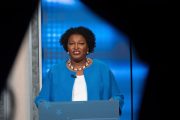
Controversy over an executive order issued by Rick Perry in 2007 is following the Texas Governor on the presidential campaign trail. In New Hampshire on Saturday and in Iowa on Monday, Perry faced questions about his order to have girls entering the sixth grade in Texas vaccinated against the human papillomavirus, a common sexually transmitted disease and the cause of about 70 percent of all cervical cancer, according to the federal Center for Disease Control.
Girls would be exempt from the order only if a parent or guardian signed an affidavit claiming a "conscientious objection." The order, signed by the Governor on February 2, 2007, became the subject of sharp and widespread criticism and the Legislature promptly passed a law revoking it. According to the ABC News blog, "The Note," Perry was asked about the controversial order during a backyard reception for the candidate at the home of state Rep. Pamela Tucker in Greenland, New Hampshire.
"I signed an executive order that allowed for an opt-out, but the fact of the matter is that I didn't do my research well enough to understand that we needed to have a substantial conversation with our citizenry," Perry said. "When you get too far out in front of the parade, they will let you know, and that's exactly what our Legislature did, and I saluted it and I said, 'Roger that, I hear you loud and clear.' And they didn't want to do it and we don't, so enough said."
But if Perry was saluting the Legislature at the time, he was probably not using all five fingers. His response was not a "Roger that," but a grudging acceptance of the inevitable. The vote in the Legislature was overwhelmingly in favor of revoking the order, and Perry knew he didn't have enough votes to sustain a veto. So he let the legislation become law without his signature. According to the Texas Tribune, he has always defended his executive order and Saturday's acknowledgement that he "didn't do my research well enough" and "got too far out in front of the parade" was his first public admission that the order was a mistake. He said so explicitly in a listener call-in talk show Monday radio station WHO.
In Des Moines, Iowa
"I'm one of the first to say we didn't approach that issue right at all," Perry told a caller who questioned the order. "We shouldn't have done it with an executive order. We should have worked with the Legislature." Perry said it was an effort to prevent cancer, but added: "That particular issue is one that I readily stand up and say I made a mistake on. I listened to the Legislature, they said that was not going to occur, and I agreed with their decision. I don't always get it right, but I darn sure listen."
While it may be both rare and refreshing to hear a politician admit he made a mistake, Perry's account of his readily agreeing with the Legislature contains a good deal of revisionist history. After the lawmakers had overturned the order, he held a press conference and bitterly denounced their action. Surrounded by women who said they'd been infected with HPV, Perry lashed out at the legislators.
"In the next year, more than a thousand women will likely be diagnosed with this insidious yet mostly preventable disease," he said at the May 9, 2007 news conference.
"I challenge legislators to look these women in the eyes and tell them, 'We could have prevented this disease for your daughters and granddaughters, but we just didn't have the gumption to address all the misguided and misleading political rhetoric.'"
When U.S. Senator Kay Bailey Hutchinson raised the issue against him in her 2010 gubernatorial primary campaign, Perry defended the executive order as an effort to save lives. Asked by a debate moderator if it had been a mistake in judgment, he replied, "No sir, not from my position." He also challenged the characterization of the vaccination order as a mandate, since there was an opt-out provision for parents.
"When you can say no, something's not a mandate," he said. "I stand proudly by my pro-life position."
As recently as September of last year, Perry was still defending the order in an interview he gave during his reelection campaign. "Let me tell you why it wasn't a bad idea: Even though that was the result I was looking for, and that (was) becoming the standard procedure for protecting young women against this very heinous deadly dreadful disease, it caused a national debate," he said. "I knew I was going to take a political hit … at the end of the day, I did what was right from my perspective, and I did something that saved people's lives and, you know, that's a big deal."
But critics say Perry may have had other than humanitarian motives in mind when he issued his executive order. The vaccine, called Gardasil, is manufactured by Merck & Co, one of the world's largest pharmaceutical companies, based in Whitehouse Station, New Jersey. The drug was approved by the federal Drug Administrating in 2006 and the Centers for Disease Control and Prevention recommended that all 11- and 12-year-old girls be vaccinated. Early in 2007 bills to require vaccination were introduced in 20 state legislatures and were adopted in three — New Jersey, New Mexico, and Virginia. The bills ran into stiff opposition elsewhere, in part because of resistance from social conservatives who saw the legislation as an interference with parental rights and decision-making authority. But financial considerations were also a factor. At $360 for the required three-shots, vaccinating all sixth-grade girls could run up a sizable tab. And it would make a lot of money for Merck, a company that had suffered a huge financial setback when its Vioxx drug was recalled.
Merck had been pushing for laws requiring the vaccinations and had doubled its lobbying efforts in Texas, the Associated Press reported, funneling some of its money through a network of women legislators called Women in Government. Perry had ties to Merck through a former chief of staff who had moved on to become one of the pharmaceutical company's three lobbyists in Texas. The Governor had also received $6,000 in contributions from Merck for his campaign for reelection in 2006.
Whatever his motive, Perry's effort to establish law by executive order should raise concern for the separation of powers. Rightly anticipating strong opposition to the vaccination mandate among the state's lawmakers, Perry simply bypassed the Legislature and established what he claimed was wise policy by executive fiat. "This executive order," he decreed, "… shall remain in effect and in full force until modified, amended, rescinded, or superseded by me or by a succeeding governor." The legislators, apparently, had other ideas and were not content to sit in Austin as potted plants while the Governor dictated the laws. The controversy brings to mind the comment attributed to presidential aide Paul Begala when Bill Clinton was expanding the power of the Oval Office through the frequent issuance of executive orders: "Stroke of the pen, law of the land. Kinda cool"
Perhaps a realization that a great many Americans don't believe that's a "kinda cool" way to make the law of the land has caused presidential candidate Rick Perry to reconsider merits of his executive order of February 2, 2007.



